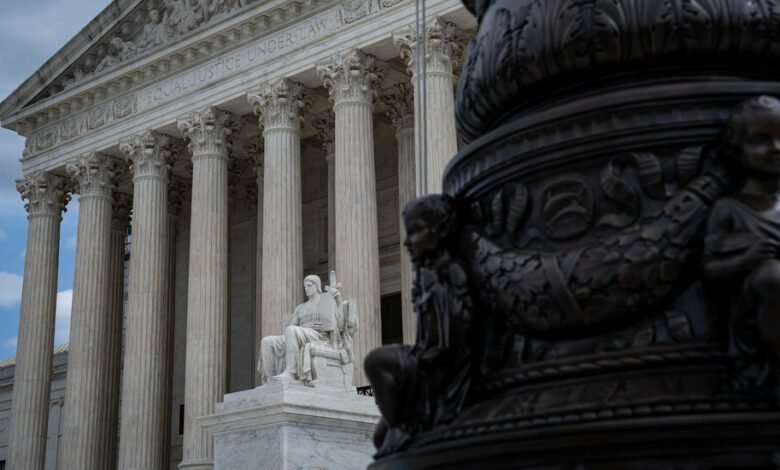Supreme Court upholds Trump-era tax provision on foreign income

The Supreme Court on Thursday upheld a tax on foreign income that helped finance cuts that President Donald J. Trump imposed in 2017, in a case that many experts warned could undermine the country’s tax system.
Justice Brett M. Kavanaugh wrote for five justices in the 7-to-2 decision. He was joined by Chief Justice John G. Roberts Jr. and the court’s three liberals.
In a concurring opinion, Judge Amy Coney Barrett, joined by Judge Samuel A. Alito Jr., explained that although she agreed with maintaining the tax, she disagreed with the majority’s broader reasoning. Justice Clarence Thomas dissented, joined by Justice Neil M. Gorsuch.
The question before the justices in the case seemed limited at first glance: Is the tax in question permitted by the Constitution, which gives Congress limited taxing powers?
Justice Kavanaugh said yes, writing: “The long-standing precedents of this court, reflected and reinforced by the long-standing practice of Congress, establish that the answer is yes.”
He nodded to broader questions at stake over the limits of federal taxing power, but said those were “potential questions for another day.”
The decision preserved the structure of the income tax system for now, avoiding what many analysts and economists warned could have been fiscal chaos if the system had been overturned.
It also opened a window into what could be the next big tax case to come to court: whether Congress can impose what is effectively a tax on Americans’ wealth, as President Biden and other Democrats have proposed doing in various ways. This issue loomed large in the opinions, highlighting the sharp divisions among the justices in how they view the notion of a wealth tax.
Agreeing, Justice Ketanji Brown Jackson laid out what was essentially a roadmap for the government to defend such a tax, should it be enacted.
She praised the majority for “wisely” taking a “restrained approach” in issuing a narrow ruling. Acknowledging that more tax fights are likely to come to court, she warned that judges should approach such disputes with similar discipline.
“I have no doubt that future Congresses will pass, and future presidents will sign, taxes that outrage one group or another – taxes that seem to some to demand too much, others to demand too little,” Judge Jackson wrote. But, he added, historical examples show that such disagreements were best resolved by voters and not by judges.
Still, conservatives on the court, including two who voted to keep the tax, argued that a hypothetical wealth tax could violate the Constitution’s guidelines, including those set out in the 16th Amendment, for what federal taxes should be.
Although Judge Barrett, in a concurring opinion, wrote that she agreed with the court’s final ruling in the case, she said that “a different tax — for example, a tax on the shareholders of a national or widely owned corporation — would present a different case .”
In a strong dissent, Justice Thomas argued that the majority upheld the tax “merely ignoring the question presented.” He said “the text and history” of the 16th Amendment made clear that “it requires a distinction between ‘income’ and the ‘source’ from which that income is ‘derived.’”
“Sixteenth Amendment ‘income’ is just realized income,” he added. “We shouldn’t have hesitated to say that in this case.”
The dispute involved a Washington state couple, Charles and Kathleen Moore, who challenged the law after being forced to pay nearly $15,000 in taxes resulting from their investment in a company in India that supplied rural farmers. The couple was supported by the Competitive Enterprise Institute, a free-market research organization in Washington.
The Moores’ investment in India falls under an obscure provision in the Tax Cuts and Jobs Act of 2017, which changed how the federal government taxes corporate profits earned abroad. Under the provision, U.S. shareholders who own 10 percent or more of foreign companies owned or controlled primarily by Americans must pay a flat tax. Previously, they owed taxes only on profits brought into the United States.
The question is whether the Moores should be subject to the tax even though they never received or realized income from the investment in question.
In 2006, according to the petition filed with the court, the couple invested $40,000 in the company KisanKraft Machine Tools Private Limited, which provided basic tools to farmers. The Moores also received shares in the company, which was founded by a friend of Mr. Moore, Ravindra Kumar Agrawal.
In 2018, the Moores discovered they owed income taxes on the company’s reinvested profits since 2006, adding about $15,000 to their tax bill. Backed by conservative and business groups, the Moores sued, saying the tax violated the Constitution’s apportionment requirements because it taxed their shares in the company, which they characterized as personal property, rather than the income they earned.
Lower courts, including a panel of judges from the U.S. Court of Appeals for the Ninth Circuit, sided with the federal government. In a dissent, Trump-appointed Judge Patrick J. Bumatay wrote that the appeals panel’s decision conflicted with “ordinary meaning, history, and precedent,” all of which recognize that “an income tax should be a tax on realized income. ”
The Moores appealed to the Supreme Court, which agreed to review the case.
In their brief, the couple argued that the Ninth Circuit’s decision “eliminates the essential restriction on Congress’s taxing power, opening the door to unapportioned property taxes (as in this case) and anything else that Congress may deem as ‘ income'”.
Lawyers for the Biden administration argued that the Ninth Circuit had “correctly rejected” the Moores’ claim that the tax was unconstitutional and argued that the Moores’ claims were “not supported by the constitutional text, congressional practice, or this court’s precedent.” . The case, they added, lacked “pressing prospective importance” because it was a flat tax that applied only to pre-2018 income.
Overshadowing the case was a larger — and still hypothetical — question of how far the Constitution allows the federal government to go in taxing wealthy individuals.
Currently, the federal government taxes income from wages, investment returns, and the sale of assets such as stocks and bonds. Progressive lawmakers, led by Senators Bernie Sanders of Vermont and Elizabeth Warren of Massachusetts, in recent years have called on the government to go further and tax what is effectively the net worth of the country’s richest people.
His proposals would include taxing very wealthy individuals on the increasing value of their investment portfolios, even if those gains exist only on paper – like a set of shares purchased for $100,000 that grow in value to $1 million, but which still were not sold. These gains are known as “unrealized” gains.
Congress has not yet passed a tax on unrealized gains. But in Thursday’s case rulings, Moore v. United States, judges were already discussing whether it would be constitutional to do so.
The majority opinion explicitly avoids a decision on this issue, but it offers evidence that it may be difficult for a wealth tax to survive the same legal test that the justices imposed in the Moore case.
Competitive Enterprise Institute general counsel Dan Greenberg expressed disappointment with the decision.
However, nodding to the broader issues that are emerging, Mr. Greenberg pointed to what he described as the “extremely narrow scope” of the decision and expressed optimism about how the majority of justices would view future tax challenges.
“If there is a challenge to a future income tax where the court must deal with the realization requirement directly, it appears that the challengers will likely receive a friendly hearing from a substantial portion of the court,” Greenberg said.
Warren celebrated the decision but warned of a protracted fight ahead.
“Right-wing billionaires hoped an obscure legal case would blow up the tax code to avoid paying what they owed, but that effort failed at the Supreme Court,” Warren said on social media. “The fight continues to tax the rich, pass a wealth tax on ultra-millionaires and billionaires, and make the system fairer.”
The case generated controversy from the beginning.
Some tax experts asked the court not to hear the case, saying it was based on inaccuracies, part of growing scrutiny over how some issues reach the Supreme Court.
In a series of in-depth articles, the trade publication Tax Notes reported that tax experts say the couple may have been more deeply involved in the company than they suggested in court filings. The Moores’ attorneys refuted concerns about the Moores’ story, saying the case record was accurate.
An attorney for the Moores, David B. Rivkin Jr., twice interviewed Justice Samuel A. Alito Jr. for The Wall Street Journal’s editorial page in the months before the case, raising questions about whether the judge should hear the dispute. Justice Alito refused to recuse himself from the case and wrote in a statement that Mr. Rivkin interviewed the judge “as a journalist, not as an advocate.”
“The case he was involved in was never mentioned; nor have we discussed any matter in this case, directly or indirectly,” Justice Alito added. “His involvement in the case was disclosed in the second article and therefore readers could take that into consideration.”
Some ethics experts also suggested that Chief Justice Roberts, Justice Thomas and Justice Jackson recuse themselves. They pointed to the stake each judge holds in a limited liability company or partnership that could benefit them if the judges declared the tax unconstitutional. The three participated in the case.
Kitty Bennett contributed to research.




